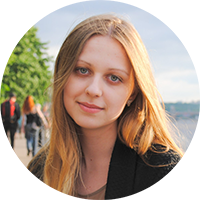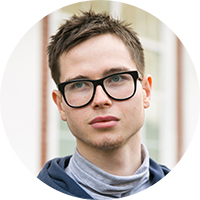‘These are the People Who Will Shape the Agenda in the Humanities’
The first Moscow-Tartu School in Digital Humanities has taken place at the Leo Tolstoy House and Museum in Yasnaya Polyana. The school‘s aim is to create an interdisciplinary academic environment in which modern computer methods are applied to the study of texts. The school was organized by the HSE School of Linguistics, Leo Tolstoy House and Museum in Yasnaya Polyana, and the Department of Russian Literature at the University of Tartu.
‘Digital humanities is an important area of development in today’s computer science, when computer facilities, methods and models are used in data processing in the humanities’, said Anastasia Bonch-Osmolovskaya, Associate Professor at the HSE School of Linguistics and one of the school’s organizers, ‘Unfortunately, this area is not as well developed in Russia as it is in the West, where a lot of researchers are involved in it. On the other hand, Russian philology has a very good tradition of various formal approaches to studying texts. We wanted to integrate this tradition with modern methods. And we also wanted to let the students see how important it is not only to be able to apply particular methods, but also to understand how the results can be interpreted. I believe this is something the other schools, European schools for example, lack: they are more about skills than interpretation’.
Roman Leibov, Associate Professor at the University of Tartu Department of Slavic Studies, said that the idea of the school developed out of the regular student philological conference in Tartu, where an additional section discussed modern approaches to philological problems related to new technologies. The decision was made to continue this debate – but not at the Conference. ‘The resulting summer school format selected by Anastasia Bonch-Osmolovskaya was a success; it includes lectures and practical tutorials on work with philological data’, said Roman Leibov.
The school attracted young researchers from various backgrounds, including philology, mathematics, computer science, and linguistics: 300 applications were received for the 30 available places. Participants came from Moscow, St. Petersburg, Petrozavodsk, Perm, Siberia, Tula, Tartu and the United States.
Some expert lectures focused on linguistics, others on traditional philological problems, and small groups of students had the opportunity to solve specific problems in workshops over that two day period.
‘The school has become an important academic event for several reasons’, said Boris Orekhov, Associate Professor at the HSE School of Linguistics, ‘First, it follows the traditions of the Moscow-Tartu semiotic school. That was a large-scale intellectual project of the Soviet era that became fertile grounds for the development of concepts and methods that have since become central pillars of contemporary humanities. In recent decades, our science hasn’t seen anything as interesting as that. And the school aimed to revive these processes, to refresh this invention and co-creation of methodological principles that all the participants are aware of.’
‘Second, students attending the school had passed a strict, highly competitive, selection process (it is pleasing that many HSE students were among the candidates). I can say that these are the people who will shape the agenda in the humanities in 20 or 25 years. The things the students heard at the school, things they agreed or argued with must have influenced them to a certain extent, and in future they will be among the factors determining key trends in philology and related areas’.

Elizaveta Kornakova, MSU
Deciding to attend the Moscow-Tartu School in Digital Humanities was a spur of the moment thing. I’ve never been interested in digital humanities before, it was something I had only heard about, but I never regretted my decision. What I liked was that the participants included people with highly varied backgrounds: philologists, programmers, linguists, mathematicians, and historians. It was great to go beyond my professional circle and talk to people who are used to approaching research from a different angle.
I took part in a tutorial in which we built social networks from classical literature. We turned works by Griboyedov, Ostrovsky, Chekhov, Mayakovsky and other authors into graphs. As a result, we got a visualization of how the structure of Russian plays changed over time. Daniil Skorinkin and Frank Fischer, our wonderful instructors from HSE, quickly and easily explained the key information to us, and always offered help when something didn’t work out or wasn’t understood.
The Moscow-Tartu school was an interesting experience for me, but it was too short. I think we could have done a lot more in our tutorial if we had a couple more days. I hope that the second Moscow-Tartu school will be longer.

Maria Krivosheina, HSE
I was part of Boris Orekhov’s tutorial on: ‘Dispersion analysis and the Iron Throne: What can statistics predict in Westeros?’ It turned out to be useful not only for HBO and George Martin fans. The saga is important here if viewed as a big mass of data, which can be used to demonstrate what digital approaches can do (for example, detecting patterns in the text).
It was exciting that we didn’t study one specific method in too much detail, and instead tried to discuss a number of different approaches, including graph theory, cluster analysis, vector analysis, etc. I was pleased with what we achieved during the tutorial. I believe we managed to accomplish quite a lot and even tried to make some predictions on future plot twists on the basis of the data we produced.

Arseny Samsonov, California State University, Los Angeles
I am part of the project studying drama using network theory. Characters were viewed as nodes in the graph, and the contacts between them were viewed as the values of edges connecting them. This approach allowed us to look at the balance of power in the drama and to detect the most influential characters using the indicators developed through the graph theory. As is common in any research, we received a lot of anomalous and obvious results. But we also detected some characters who defined the course of events and yet were not obvious for the reader. This was when realized that our effort had borne fruit.
I saw a new science evolving. Philology is not about making and proving hypotheses. Works by philologists I’ve read are literary works written under the impression from other literary works. The aim of digital humanities is to make strong conclusions about how a text works. A program is unable to detect moral contents of the book or answer questions on what the author’s intentions might have been, but it can calculate the frequency of use of certain types of words, or detect the poem’s metre. These observations can be a tool for philologists in a traditional sense and spark new ideas, but, most probably, computer analysis of literature will prompt researchers to ask some brand new questions.

German Palchikov, HSE
On the one hand, I acquired new skills and knowledge (it is thanks to the school that I finalized the topic of my master’s thesis and even wrote a draft plan). On the other hand, I met some very interesting people, both tutors in the tutorials and the students who came to study literature and humanities from a new perspective. I have continued to talk with them since the school, and I hope this may evolve into new projects.
I was in the tutorial ‘Social networks in classical works’. We not only learned about graph theory and learned to create social networks, but also wrote scripts that will be useful for future research, created social networks for several classical plays, and expanded the material for future studies.
Prepared by Alena Churakova, intern at the HSE Public Relations Office
See also:
HSE Shares Its Experience of Urban Strategies at International Summer School in China
In the context of intensifying global geopolitical and technological competition, leading Chinese educational institutions—Zhejiang International Studies University and Peking University—organised an International Summer School. Their joint programme focused on studying global, regional, and urban development strategies. The HSE Faculty of Urban and Regional Development took part in this event.
HSE GSB and Alfa-Bank Host Summer School for Chinese Students
The international summer school Digital Product Management, a joint educational project by the HSE Graduate School of Business (HSE GSB) and Alfa-Bank, brought together over 30 students from leading Chinese universities.
HSE University Students and Postgraduates Take Part in Peking University International Summer School
In July 2025, Peking University hosted its annual Quantum Molecular Dynamics Summer School, which has moved onto an international stage. Its first foreign guests were students and postgraduates from the HSE Tikhonov Moscow Institute of Electronics and Mathematics (MIEM). They took part in an extensive academic programme and had the opportunity to visit a laboratory that works with optoelectronic materials and energy devices.
‘Student Ideas Shed Light on Key Challenges for Urban Development’
The first international joint summer school of the Vysokovsky Graduate School of Urbanism (GSU) at both the HSE Faculty of Urban and Regional Development and Brest State Pushkin University (BrSU), hosted by BrSU, has come to a close. The programme focused on studying buffer zones along the railway lines encircling the city centre. Participants included students from the GSU’s Urban Planning degree programme, as well as students from BrSU and Brest State Technical University.
‘A Laboratory at 3,000 Metres’: HSE University–St Petersburg to Start Call for First Summer School in Himalayas
HSE University–St Petersburg has announced the call for the Summer School in the Himalayas, which will take place from June 30 to July 13, 2025. The Summer School is the follow-up to two expeditions in the Himalayas organised by the St Petersburg School of Social Sciences in 2024. The programme allows bachelor's, master's, and PhD students to immerse themselves in research on climate change and sustainability in local communities in the unique natural laboratory of the Himalayan region.
From Sequencing to Constructing a Cardio Panel: Summer School in Cardiogenetics
From August 19 to 29, the Continuing Professional Development Centre of the HSE Faculty of Computer Science hosted the summer school 'Cardiogenetics: From Sequencing to Constructing a Cardio Panel,' organised in collaboration with the Russian Academy of Sciences' Institute of Analytical Instrumentation (IAI) and Institute of Spectroscopy (ISAN), and the Syntol company. The summer school was conducted within the framework of the Federal Research Programme for Genetic Technologies Development for 2019–2027 (Project 15.IP.21.0004).
'These Are Unforgettable Impressions, I Will Cherish Them Forever'
HSE St Petersburg International Summer School is in full swing—right now, international students from 12 countries are attending lectures and enjoying the cultural programme. The HSE News Service talked to the participants about their most vivid impressions.
HSE University-St Petersburg Hosts Students from 12 Countries at the International Summer School
On July 10, HSE University-St Petersburg launched the International Summer School—a series of classes for students from India, Vietnam, the Republic of Korea and other countries. Foreign guests are getting to know the university, attending lectures in six fields of study, and enjoying an inspiring cultural programme.
The XI Russian-Chinese Summer School on International Relations Kicks Off at HSE University
On July 1, 2024, the opening ceremony of the XI International Russian-Chinese Summer School on International Relations, titled ‘Partnership and Cooperation in the New World Order,’ took place. The event was organised by the HSE Faculty of World Economy and International Affairs in collaboration with HSE Centre for Comprehensive European and International Studies (CCEIS). Graduate and postgraduate students from various countries have come to Moscow to study international relations and collectively envision a new world order.
HSE University Holds 10th Summer School ‘Eye-tracking in the Lab and Beyond’
This year, more than 100 students from Russia and abroad took part in the 10th summer neurolinguistic school, ‘Eye-tracking in the Lab and Beyond’. The school is held annually by the HSE Center for Language and Brain. Leading experts spoke about advanced developments and research in the field of video-oculography.


